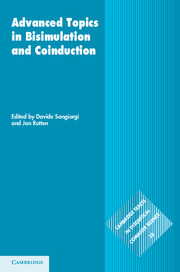
-
Select format
-
- Publisher:
- Cambridge University Press
- Publication date:
- November 2011
- October 2011
- ISBN:
- 9780511792588
- 9781107004979
- Dimensions:
- (228 x 152 mm)
- Weight & Pages:
- 0.61kg, 340 Pages
- Dimensions:
- Weight & Pages:
You may already have access via personal or institutional login
Book description
Coinduction is a method for specifying and reasoning about infinite data types and automata with infinite behaviour. In recent years, it has come to play an ever more important role in the theory of computing. It is studied in many disciplines, including process theory and concurrency, modal logic and automata theory. Typically, coinductive proofs demonstrate the equivalence of two objects by constructing a suitable bisimulation relation between them. This collection of surveys is aimed at both researchers and Master's students in computer science and mathematics and deals with various aspects of bisimulation and coinduction, with an emphasis on process theory. Seven chapters cover the following topics: history, algebra and coalgebra, algorithmics, logic, higher-order languages, enhancements of the bisimulation proof method, and probabilities. Exercises are also included to help the reader master new material.
Contents
Metrics
Altmetric attention score
Full text views
Full text views help Loading metrics...
Loading metrics...
* Views captured on Cambridge Core between #date#. This data will be updated every 24 hours.
Usage data cannot currently be displayed.
Accessibility standard: Unknown
Why this information is here
This section outlines the accessibility features of this content - including support for screen readers, full keyboard navigation and high-contrast display options. This may not be relevant for you.
Accessibility Information
Accessibility compliance for the PDF of this book is currently unknown and may be updated in the future.


